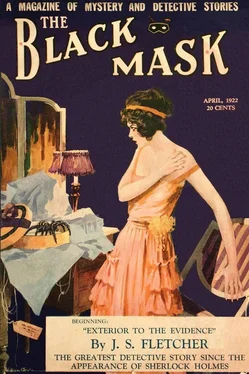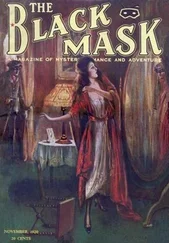J. Fletcher - The Black Mask Magazine (Vol. 5, No. 1 — April 1922)
Здесь есть возможность читать онлайн «J. Fletcher - The Black Mask Magazine (Vol. 5, No. 1 — April 1922)» весь текст электронной книги совершенно бесплатно (целиком полную версию без сокращений). В некоторых случаях можно слушать аудио, скачать через торрент в формате fb2 и присутствует краткое содержание. Город: New York, Год выпуска: 1922, Издательство: Pro-distributors Publishing Company, Жанр: Детектив, на английском языке. Описание произведения, (предисловие) а так же отзывы посетителей доступны на портале библиотеки ЛибКат.
- Название:The Black Mask Magazine (Vol. 5, No. 1 — April 1922)
- Автор:
- Издательство:Pro-distributors Publishing Company
- Жанр:
- Год:1922
- Город:New York
- ISBN:нет данных
- Рейтинг книги:3 / 5. Голосов: 1
-
Избранное:Добавить в избранное
- Отзывы:
-
Ваша оценка:
- 60
- 1
- 2
- 3
- 4
- 5
The Black Mask Magazine (Vol. 5, No. 1 — April 1922): краткое содержание, описание и аннотация
Предлагаем к чтению аннотацию, описание, краткое содержание или предисловие (зависит от того, что написал сам автор книги «The Black Mask Magazine (Vol. 5, No. 1 — April 1922)»). Если вы не нашли необходимую информацию о книге — напишите в комментариях, мы постараемся отыскать её.
The Black Mask Magazine (Vol. 5, No. 1 — April 1922) — читать онлайн бесплатно полную книгу (весь текст) целиком
Ниже представлен текст книги, разбитый по страницам. Система сохранения места последней прочитанной страницы, позволяет с удобством читать онлайн бесплатно книгу «The Black Mask Magazine (Vol. 5, No. 1 — April 1922)», без необходимости каждый раз заново искать на чём Вы остановились. Поставьте закладку, и сможете в любой момент перейти на страницу, на которой закончили чтение.
Интервал:
Закладка:
“You see that?” she questioned. “I made that this afternoon looking for what I’m going to show you. These are my tracks. Look at the others.”
With a gasp the dectectives read the signs in the baked mud — four sets of tracks of a man’s feet — one plain set going toward the rear of the cobbler’s shop — one with the patch returning — another, with the patch, going toward the shop and, in places, superimposed on the first — and then a set of plain tracks returning to the little door to the street.
Never waiting for a comment, Nell Anthony’s gesture led them across the lot to the rear of the cobbler’s shanty facing on the other street. Before the window in the rear she paused and pointed at the casing. She did not need to explain it to these trained eyes. Along the middle of the sash, just under the catch, the paint had been scraped away by the blade of a knife, inserted to open the window. A plain, neat and simple job of housebreaking was revealed as clearly as if all had seen it.
“Now, then,” Nell Anthony demanded, triumphantly, “who did that? Who stole my Jim’s shoes and put them back again after pulling off a job? Who tried to slough my man and him not out of his bed in a week, as all the neighbors will swear to? Answer me that, you dicks.”
There was a silence in the vacant lot — silence as disconsolate as the dismantled Fords. Finally Harrison ventured to break it.
“Mrs. Anthony,” he said, “admitting that Jim wasn’t in on this deal, have you any idea who did pull it?”
“Huh,” she answered. “Have I now? I’m Jim Anthony’s wife and he’d rather see me his widow, much as he loves me and I love him, before he’d see me squeal to a copper. Go ask June Jennings.”
The last sentence was spoken with so much bitterness that the three men started.
“We — we have asked her, ma’am,” said Kelso, finally. With a laugh, Nell Anthony had started for the gate, but she flung a reply back over her shoulder.
“Well, ask her again,” she said. “She was boasting all over the neighborhood this morning that she was going to wear real jewelry. Go ask her, the hussy. I shouldn’t say this much, but she tried to cop my Jim, because anybody can see he’s the best man in the mob. Ask her. She knows the man who pulled the job.”
Striding hastily forward, Harbin put his hand on the woman’s shoulder.
“You said ‘the man, ’ Mrs. Anthony,” he reminded. “Do you mean that it was an inside job?”
“Inside is right,” was the cryptic answer; and with a defiant smile she stooped and vanished through the little gate, leaving the three detectives to stare in contemplation at the dissolving vehicles and the structure of their solution of the mystery.
V
“Inside job!” echoed Harrison. “That’s what I told you, Harbin. Remember the girl — and the overshoes? Remember those one-way tracks up there?”
Harbin did remember all of these things. In the last few minutes he had not been able to remember anything else. Previously he had thought a man’s footprints as open as his soul was closed, but up there in Garrison’s garden and here in this sordid lot were sets of them that did not track at all straight with honesty and square dealing. Impatiently, he beckoned his companions and without waiting for a street-car they hailed a taxi and sped to the Garrison home.
Garret Garrison and his wife had returned from their sad errand and the banker himself received them. This made it a little easier for the detectives, who were able to state their suspicions bluntly to a man not inclined to hysterics and used to dealing with the police.
The result was rather shattering to the structure of evidence the detectives had built up — if that tottering edifice could longer be called a structure — but they stood it like men and pressed on to their new conclusions.
Confronted by facts and suspicions in the presence of her father, Miss Garrison made a frank confession — under pledge of secrecy, of course. It seems that she had practised a little deceit. Having a horror of funerals, she had played a double game — avoided the obsequies of her aunt on the plea of sudden illness and also kept a perfectly proper sub rosa engagement with a young man who lived around the corner. The two had attended a theatre and afterward were chatting in the drawing-room, under a rather dim light, when alarmed by the noise in the upper hallway and the escape of a man through the library window.
Quick-witted, like her father, Miss Garrison had instantly realized the embarrassment which would be caused all around by the disclosure of her deception and had practically pushed young Tom Chalmers out of the drawing-room window. She had thrown his hat, coat and stick after him but had forgotten his rubbers. And like the faithful servitor he was, Chalmers had crashed through the hedge and faded out of the picture until betrayed by his one-way footprints.
“Do you mean to say, Miss Garrison,” Harbin asked, “that there was only one burglar in the house?”
“Only one,” she answered, steadily now, with her father’s hand in hers. “I saw him distinctly as he swung around the newel post and darted into the library.”
“Dave Bamfield,” whispered Kelso. “We’ve got his overcoat.”
“He had on a bright plaid cap,” went on Miss Garrison.
“Red Doran,” muttered Harrison. “We’ve got the cap.”
At this moment the telephone bell in the library rang and Garrison went to answer it.
“Detective Jacobs of Headquarters wishes to talk with one of you gentlemen,” he announced a minute later, and Harbin went to the phone.
“Say, Harbin,” said Jacobs, “the Old Man says to go slow. There’s something damn queer about this Garrison case.”
“You said something,” replied Harbin, “but what now?”
“Well, Bamfield and Doran have got a lawyer and sent him over to Eichorn’s restaurant to get their overcoats.”
“Their what?” shouted Harbin.
“Their overcoats. They say they left them there night before last when they left in a hurry. Doran’s coat is there but Bamfield’s is missing and Doran’s cap — the one he uses when he’s auto-riding and carries folded up in a pocket is gone out of his coat. The waiters remember that they had ’em when they came in and left without ’em. They thought they would be back in a few minutes and didn’t say anything about it.”
“Holy mackerel!” said Harbin and hung up the phone without a reply.
When he returned to the drawing-room Miss Garrison was still describing the burglar. He arrived just in time to catch a thread of it.
Harbin forgot his manners, his surroundings and everything else as, with a bellowed “Come on, you!” he leaped for the front door.
“Do you know who did it?” demanded the slow thinking Kelso on the way downtown.
“Yes,” barked Harbin, “a sneak thief.”
“Sneak, nothing,” interrupted Harrison. “We’ve got one burglar left anyway.”
“Yes,” admitted Harbin, “one — such as he is — a dirty sneak — the man who stole Bamfield’s overcoat and Doran’s cap out of Eichorn’s and left them behind him for a plant. The man who stole Jim Anthony’s shoes to track him into the pen. The man who used Evans’s gun and Doran’s car for the same reason. What I don’t know is where he got his nerve and his idea.”
“Nell said to ask June Jennings,” reminded Kelso.
It was rather a bitter pill, but Harrison and Kelso went to the woman’s prison for the girl while Harbin continued downtown. He asked them to wait until he returned to Headquarters and to have the Old Man himself there. Two hours later the mystery of the Garrison jewel robbery with its wanton clues and its track-and-a-half footprints was definitely cleared up.
Читать дальшеИнтервал:
Закладка:
Похожие книги на «The Black Mask Magazine (Vol. 5, No. 1 — April 1922)»
Представляем Вашему вниманию похожие книги на «The Black Mask Magazine (Vol. 5, No. 1 — April 1922)» списком для выбора. Мы отобрали схожую по названию и смыслу литературу в надежде предоставить читателям больше вариантов отыскать новые, интересные, ещё непрочитанные произведения.
Обсуждение, отзывы о книге «The Black Mask Magazine (Vol. 5, No. 1 — April 1922)» и просто собственные мнения читателей. Оставьте ваши комментарии, напишите, что Вы думаете о произведении, его смысле или главных героях. Укажите что конкретно понравилось, а что нет, и почему Вы так считаете.












